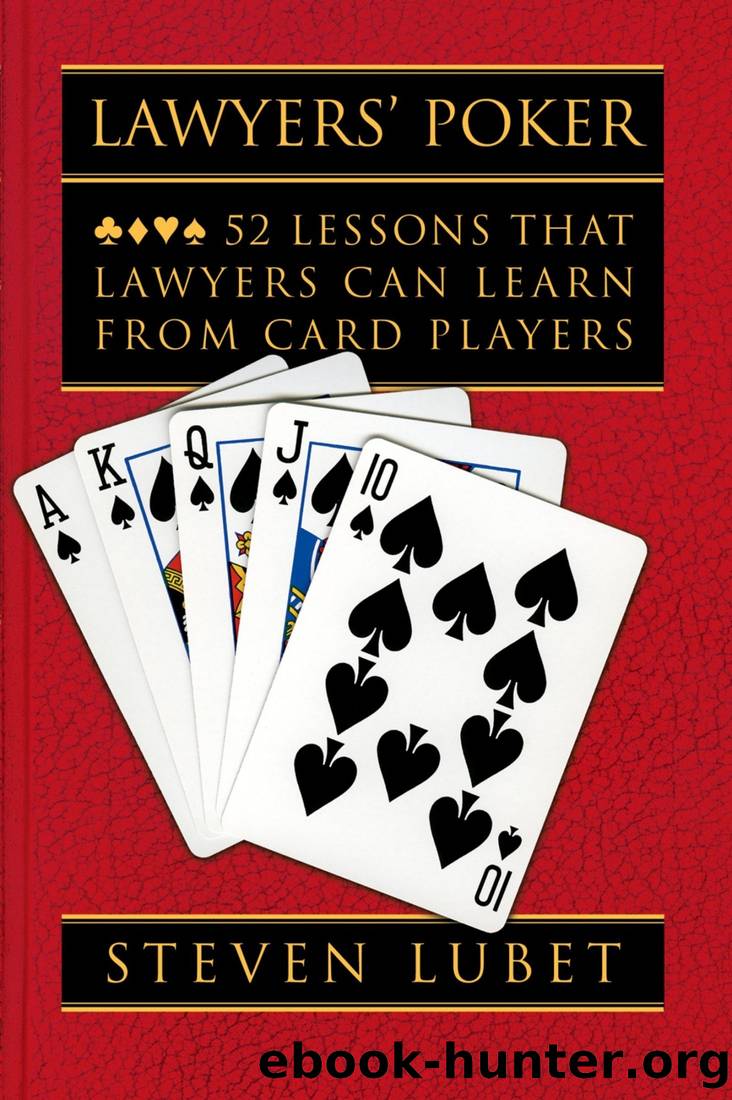Lawyers' Poker: 52 Lessons That Lawyers Can Learn From Card Players by Steven Lubet

Author:Steven Lubet
Language: eng
Format: mobi
Tags: Litigation, Trial Practice, Law, Legal Profession
ISBN: 9780195369014
Publisher: Oxford University Press
Published: 2006-05-24T21:00:00+00:00
l e s s o n 2 : Taking Their Measure
What is the most important information in a poker game? You might think it would be the cardsâare they rags or the nuts, or somewhere in between? But that would be wrong. In 138 fact, the cards are strictly secondary, really little more than
mthe tableaux against which the game is played. The more important information concerns the players themselves. Are they tight or loose? Can they be bluffed into folding or, better yet, drawn deeply into a hopeless pot? Will they overplay their hands, or are they too timid to go all in? Are they greedy, gullible, patient, or slick? With that sort of information, you can usually win even with bad hands and beat your opponents (in the long run) no matter what they holdâwhich is why Yardley was fond of saying that he played his opponents, not the cards. Or, to paraphrase Shakespeare, the key is not in our cards, but in ourselves.
You have to understand your opponentsâindeed, you have to be able to see through themâin order to win consistently at either poker or law. In his book Total Poker, the British journalist David Spanier used a vignette from a film to illustrate why sizing up your adversary is crucial to success. As Spanier explained, â[T]he best film about poker, curiously enough, isnât about poker at all. Itâs The Hustler (1961), which is about pool playing.â Evaluating the opposition is a universal skill.
Based on a novel by Walter Tevis, The Hustler is the story of Fast Eddie Felson (played by Paul Newman), a young pool player on the make. Eddie is determined to establish his reputation by beating the famed Minnesota Fats, but first he needs to raise a stake by winning some money in a small-town dive. As the film opens, we see Eddie and his pal Charlie entering a slummy bar. The two men begin drinking and playing pool, loudly pretending to be drunk. Eddie loses game after game, attracting attention with his ostentatious complaints, until he somehow manages an impossible threecushion shot that ends when the ball runs the length of the 139
table and into the corner pocket. m
âYou couldnât play that shot again in a million years,â says Charlie.
âI couldnât?â sneers Eddie. âSet âem up again the way the were before . . . bet ya twenty bucks.â Eddie tries the shot again, but he misses badly. In fact, the cue ball flies off the table, as the locals get a good laugh. âSet âem up again,â insists Eddie, but Charlie will have none of it. Stumbling a bit, Eddie angrily slams his money down on the table, demanding to play again. He seems to be challenging Charlie, but of course he is looking around the bar for a mark.
Eddie notices something in the bartenderâs eye and realizes that heâs found his man. He takes out $100, and the barkeep eagerly announces that he will take the bet if no one else will.
âDonât bet any more money on the damn fool shot,â warns Charlie, heading for the door.
Download
This site does not store any files on its server. We only index and link to content provided by other sites. Please contact the content providers to delete copyright contents if any and email us, we'll remove relevant links or contents immediately.
Objection! by Nancy Grace(1775)
Apeirogon by Colum McCann(1688)
Anatomy of Injustice by Raymond Bonner(1650)
That Every Man Be Armed by Stephen P. Halbrook(1569)
Civil Procedure (Aspen Casebooks) by Stephen C. Yeazell(1537)
The Vaccine Court by Rohde Wayne(1491)
Injustices by Ian Millhiser(1486)
Storytelling for Lawyers by Meyer Philip(1451)
A Practical Guide to International Arbitration in London by Hilary Heilbron(1422)
Restitution by Restitution(1420)
Coercing Virtue by Robert H. Bork(1352)
Broken Scales by Joel Cohen(1343)
Tangled Webs: How False Statements Are Undermining America: From Martha Stewart to Bernie Madoff by James B. Stewart(1328)
The Tools of Argument: How the Best Lawyers Think, Argue, and Win by Joel Trachtman(1299)
A Matter of Interpretation by Antonin Scalia(1297)
INDEFENSIBLE: One Lawyer's Journey Into the Inferno of American Justice by Feige David(1278)
American Tragedy by Lawrence Schiller & James Willwerth(1264)
A Religious Orgy in Tennessee by H.L. Mencken(1240)
Tangled Webs by James B. Stewart(1240)
